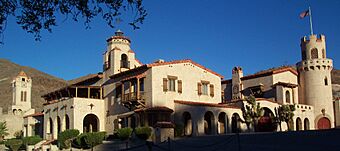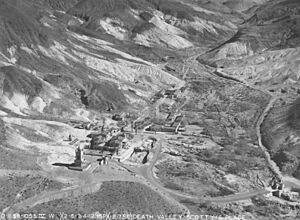Scotty's Castle facts for kids
Quick facts for kids |
|
|
Scotty's Castle
(Death Valley Scotty Historic District) |
|

Scotty's Castle
|
|
| Location | Death Valley National Park |
|---|---|
| Nearest city | Beatty, Nevada, USA |
| Area | 719.57 hectares (1778.0574 acres) |
| Built | 1922 - 1931 |
| Architect | Martin de Dubovay |
| Engineer | Mat Roy Thompson |
| Designer | Charles Alexander MacNeilledge |
| Architectural style | Provincial Spanish (Mexican, Spanish, and Mediterranean influences) |
| NRHP reference No. | 78000297 |
| Added to NRHP | July 20, 1978 |
Scotty's Castle is a large, fancy house located in the Grapevine Mountains of northern Death Valley National Park, California. It's also known as Death Valley Ranch. Even though it's called a castle, it's actually a beautiful villa built in the Mission Revival and Spanish Colonial Revival styles.
The "Scotty" in the name refers to Walter E. Scott, a gold prospector. However, Walter Scott never actually owned the property.
This unique ranch is about 45 miles (72 km) north of Stovepipe Wells, California. You can reach it by taking California State Route 190 to Scotty's Castle Road. It's also about a three-hour drive from Las Vegas, Nevada.
Scotty's Castle faced big challenges. It was badly damaged by a flood in October 2015. Then, a fire in 2021 destroyed the old garage and workshop, which was being used as the visitor center. Because of these events, Scotty's Castle was closed to visitors for a long time.
Contents
Building Scotty's Castle
Construction on Scotty's Castle began in 1922. It cost a lot of money, somewhere between $1.5 and $2.5 million!
The Unlikely Friendship
The story of Scotty's Castle involves a very interesting friendship. Walter E. Scott, known as "Death Valley Scotty," was a gold prospector, performer, and even a bit of a trickster. He convinced a rich man from Chicago named Albert Mussey Johnson to put money into a gold mine in the Death Valley area.
At first, Mr. Johnson was upset when he found out the mine was not real. But he became fascinated by Walter Scott's colorful personality. Soon, the two men became good friends, even though they were very different. By 1937, Mr. Johnson had bought more than 1,500 acres (607 hectares) of land in Grapevine Canyon, where the ranch stands.
A Winter Home
Mr. Johnson and his wife, Bessie, visited the Death Valley area many times. Mr. Johnson's health even improved during these trips. Mrs. Johnson thought it would be a great idea to build a comfortable place for their vacations. This is how the villa became their winter home.
The Johnsons hired talented people to build their dream home. Martin de Dubovay was the architect, who designed the building. Mat Roy Thompson was the engineer and led the construction. Charles Alexander MacNeilledge was the designer, helping with the look and feel of the castle.
Challenges During Construction
There was a big surprise during the building process. The first land survey was wrong! The land where they were building Death Valley Ranch actually belonged to the government. Their own land was further up the canyon. Construction stopped while they fixed this mistake.
Before building could start again, the stock market crashed in 1929. This made it hard for Mr. Johnson to finish the castle because he lost a lot of money. Walter Scott suggested that they could rent out rooms at Death Valley Ranch to earn some income.
Becoming a National Park Site
The Johnsons did not have any children. They hoped that the National Park Service would buy their property one day. In 1970, the National Park Service bought the villa for $850,000. They bought it from the Gospel Foundation, a charity Mr. Johnson had started in 1946. The Johnsons had left the property to this foundation.
Walter Scott was cared for by the Gospel Foundation after Mr. Johnson passed away. Scott himself died in 1954. He was buried on a hill overlooking Scotty's Castle, where he can still be found today.
How Scotty's Castle Got Power
Scotty's Castle had a very clever system for water and electricity.
Water and Electricity from Nature
The springs in Grapevine Canyon provided all the water for the ranch. This water was also used to make electricity! The springs were about 300 feet (91 meters) higher than the villa. This height created enough water flow and pressure to spin a special wheel called a Pelton wheel. The Pelton wheel then ran a generator, which made electricity for the villa.
The power was kept steady and had a backup system. This backup came from a large group of nickel-iron batteries hidden in tunnels under the house. The springs provided plenty of water for everything at the ranch, with extra water left over.
Cooling and Heating Systems
Inside the Great Hall, there was a unique water fountain. Water dripped down a rock wall, which helped cool the air through evaporation. The water then collected in a basin and was used again.
Near the main house, there was a large solar water heater from the 1930s. It was much bigger than the solar heaters we see today. There was also a large pile of old railroad ties nearby. These ties were saved from the Tonopah and Tidewater Railroad and likely used for fuel.
Recent Challenges and Reopening
Scotty's Castle has faced some tough times in recent years.
The 2015 Flood
On October 18, 2015, a huge rainstorm hit the Death Valley area. Nearly 3 inches (7.6 cm) of rain fell as the storm stayed over Grapevine Canyon for five hours. This caused a flash flood at Scotty's Castle. Mud and debris piled up around the buildings, and the visitor center had about 1 foot (30 cm) of mud inside. The road leading to the property was also destroyed.
Because of the flood, the property was closed for a long time for repairs. The castle itself was closed to the public until 2023. However, special "flood recovery tours" of the grounds were offered between December 2017 and April 14, 2018.
The 2021 Fire
On April 22, 2021, a fire broke out. It destroyed the historic garage and workshop, which dated back to 1922 and was being used as the visitor center. Another historic building on the property was also lost. Investigators from the California Department of Forestry and Fire Protection said the fire started inside the Visitor Center. However, they couldn't figure out the exact cause.
Luckily, the main castle building was not damaged. But this fire delayed the repair efforts and pushed back the public reopening until 2023. The National Park Service plans to rebuild the garage and workshop.
Visiting Scotty's Castle
In-Person Tours
Because of the 2015 flood and 2021 fire, the castle and its grounds are mostly closed to the public. However, you can sometimes join special "Flood Recovery" tours that require tickets.
Before these events, about 100,000 people visited the villa each year. You can still see the Johnsons' original furniture and clothes inside. The National Park Service offers guided tours of Scotty's Castle for a fee. Park rangers dress in 1930s-style clothes to help you feel like you've stepped back in time. During the tour, you can hear the sounds of a 1,121-pipe Welte theater organ.
There's also an "underground mystery tour" if you want to see how the building works behind the scenes. About a quarter-mile (0.4 km) of tunnels run under the castle. Here, you can visit the powerhouse and see thousands of tiles that were meant for a swimming pool that was never finished. The tunnels also hold hundreds of nickel-iron battery cells, which were used to keep the power steady and provide backup electricity. The main house tour is accessible for people with disabilities, but the underground tour is not.
Virtual Reality Tours
If you can't visit in person, you can explore Scotty's Castle in 3D virtual reality! You can do this from a computer, smartphone, or with VR goggles on the Death Valley Conservancy Website. This amazing virtual tour was created by the Death Valley Conservancy and the National Park Service working together.
See also
 In Spanish: Castillo de Scotty para niños
In Spanish: Castillo de Scotty para niños




